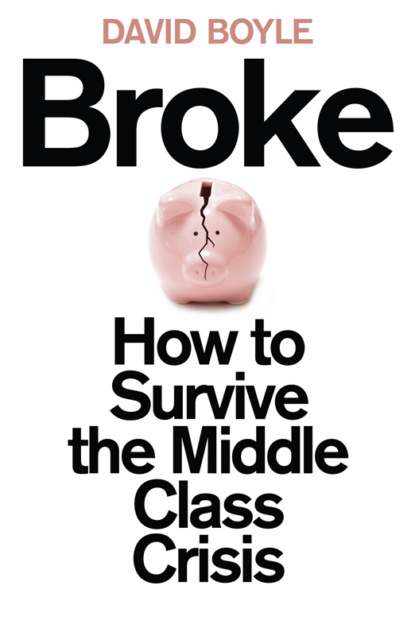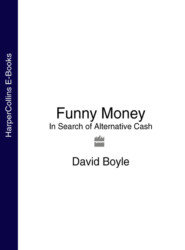По всем вопросам обращайтесь на: info@litportal.ru
(©) 2003-2024.
✖
Broke: Who Killed the Middle Classes?
Автор
Год написания книги
2018
Настройки чтения
Размер шрифта
Высота строк
Поля
Broke: Who Killed the Middle Classes?
David Boyle
If you thought being middle-class meant your own home, something set aside for the kids and a comfortable retirement – think again.For the first time ever, today’s middle classes will struggle to enjoy the same privileges of security and comfort that their grandparents did. How did this situation come about? What can be done about it?In this beautifully shaped inquiry, David Boyle questions why the middle classes are diminishing and how their status, independence and values are being eroded. From Thatcher’s boost of the mortgage market to Blair and Brown’s posturing over public services, ‘Broke’ examines the key moments in recent history that created ‘the squeezed middle’.Can the middle classes be revived? Should they be? Although they were not innocent in their downfall, Boyle argues that a newly galvanised middle class could be the key to future economic stability. The middle class may be broke, but it is not beyond repair.
Broke
Who Killed the Middle Classes?
DAVID BOYLE
Copyright (#ulink_9b591fad-de88-596b-b50d-b0a5c9d37801)
Fourth Estate
An imprint of HarperCollinsPublishers Ltd.
1 London Bridge Street
London SE1 9GF
www.harpercollins.co.uk (http://www.harpercollins.co.uk/)
First published in Great Britain by Fourth Estate 2013
Copyright © David Boyle 2013, 2014
David Boyle asserts the moral right to be identified as the author of this work.
A catalogue record for this book is available from the British Library.
Cover image © Shutterstock
All rights reserved under International and Pan-American Copyright Conventions. By payment of the required fees, you have been granted the non-exclusive, non-transferable right to access and read the text of this ebook on-screen. No part of this text may be reproduced, transmitted, down-loaded, decompiled, reverse engineered, or stored in or introduced into any information storage and retrieval system, in any form or by any means, whether electronic or mechanical, now known or hereinafter invented, without the express written permission of HarperCollins ebooks
HarperCollinsPublishers has made every reasonable effort to ensure that any picture content and written content in this ebook has been included or removed in accordance with the contractual and technological constraints in operation at the time of publication
Source ISBN: 9780007491056
Ebook Edition © April 2013 ISBN: 9780007491049
Version: 2017-10-31
Dedication (#ulink_b159e4d8-30dc-5456-bde0-cb1f910e39f2)
For William
Contents
Title Page (#u13204896-39e3-5c24-86ca-508ac79938fe)
Copyright (#ud2cdd7d0-efab-55ee-ad1a-65e71e1c16e2)
Dedication (#u6334d989-64df-504c-aa91-41539d4ba628)
Prologue (#uc6f3e2b5-9262-52de-910c-1b1ddfc4a7e4)
1. The scene of the crime (#u266ac464-82bb-5b2e-a831-9e6b975357ed)
2. The first clue: the staggering house-price escalator (#udb76fea3-72ef-5196-b4a1-b1f5963bc834)
3. The second clue: the strange case of the disappearing banks (#litres_trial_promo)
4. The third clue: the corrosive explosion of finance (#litres_trial_promo)
5. The fourth clue: the dog that didn’t bark (#litres_trial_promo)
6. The fifth clue: the great education panic (#litres_trial_promo)
7. The sixth clue: the strange case of the disappearing professionals (#litres_trial_promo)
8. Following the clues, unmasking the villains (#litres_trial_promo)
Afterword to the Paperback Edition – The Year Everything Changed: 2013 (#litres_trial_promo)
Keep Reading (#litres_trial_promo)
Notes (#litres_trial_promo)
Acknowledgements (#litres_trial_promo)
About the Author (#litres_trial_promo)
By the Same Author (#litres_trial_promo)
About the Publisher (#litres_trial_promo)
Prologue (#ulink_4df65292-75c8-5923-8295-a7bb32d1b00d)
‘By the people, I mean the middle classes, the wealth and intelligence of the country, the glory of the British name.’
Henry, Lord Brougham, 1831
I was born in a corner of central London that wraps itself around a great grey-green greasy stretch of water called the Regent’s Canal. It was and is known as Little Venice.
As anyone familiar with Little Venice will know, this defines me inescapably as middle-class. Not just slightly middle-class, but staggeringly, swelteringly, stratospherically middle-class, as middle as you can get. And not just by the broad American definition (average income) either, but by the specific British definitions which are harder to pin down, but which seem to be about attitudes and upbringing, culture and prejudices.
But there are many kinds of middle class, even in the UK, and I hope this book will strike a chord with all of them. From the first-generation middle classes who followed the entrepreneurial path set out by Margaret Thatcher right through to the crustiest scion of the landed gentry. From the brand-new estate outside Bishop’s Stortford to the tumbledown off-grid eco-cottage outside Totnes. I mention Little Venice because anyone reading this book deserves to know about the niche in the class system I am writing from, but I am only too aware that there is more than one way of being middle-class.
In my case, I am also middle-class because my parents are. Both my grandfathers were in the services, one rising to be a colonel in the army and the other to be a captain in the navy. Their service pensions and various modest pots of inherited money and property gave them relatively comfortable retirements. I owe my grandparents a great deal for their resources of love and care, but also perhaps for placing me so unambiguously in such a recognizable spot in the class system.
David Boyle
If you thought being middle-class meant your own home, something set aside for the kids and a comfortable retirement – think again.For the first time ever, today’s middle classes will struggle to enjoy the same privileges of security and comfort that their grandparents did. How did this situation come about? What can be done about it?In this beautifully shaped inquiry, David Boyle questions why the middle classes are diminishing and how their status, independence and values are being eroded. From Thatcher’s boost of the mortgage market to Blair and Brown’s posturing over public services, ‘Broke’ examines the key moments in recent history that created ‘the squeezed middle’.Can the middle classes be revived? Should they be? Although they were not innocent in their downfall, Boyle argues that a newly galvanised middle class could be the key to future economic stability. The middle class may be broke, but it is not beyond repair.
Broke
Who Killed the Middle Classes?
DAVID BOYLE
Copyright (#ulink_9b591fad-de88-596b-b50d-b0a5c9d37801)
Fourth Estate
An imprint of HarperCollinsPublishers Ltd.
1 London Bridge Street
London SE1 9GF
www.harpercollins.co.uk (http://www.harpercollins.co.uk/)
First published in Great Britain by Fourth Estate 2013
Copyright © David Boyle 2013, 2014
David Boyle asserts the moral right to be identified as the author of this work.
A catalogue record for this book is available from the British Library.
Cover image © Shutterstock
All rights reserved under International and Pan-American Copyright Conventions. By payment of the required fees, you have been granted the non-exclusive, non-transferable right to access and read the text of this ebook on-screen. No part of this text may be reproduced, transmitted, down-loaded, decompiled, reverse engineered, or stored in or introduced into any information storage and retrieval system, in any form or by any means, whether electronic or mechanical, now known or hereinafter invented, without the express written permission of HarperCollins ebooks
HarperCollinsPublishers has made every reasonable effort to ensure that any picture content and written content in this ebook has been included or removed in accordance with the contractual and technological constraints in operation at the time of publication
Source ISBN: 9780007491056
Ebook Edition © April 2013 ISBN: 9780007491049
Version: 2017-10-31
Dedication (#ulink_b159e4d8-30dc-5456-bde0-cb1f910e39f2)
For William
Contents
Title Page (#u13204896-39e3-5c24-86ca-508ac79938fe)
Copyright (#ud2cdd7d0-efab-55ee-ad1a-65e71e1c16e2)
Dedication (#u6334d989-64df-504c-aa91-41539d4ba628)
Prologue (#uc6f3e2b5-9262-52de-910c-1b1ddfc4a7e4)
1. The scene of the crime (#u266ac464-82bb-5b2e-a831-9e6b975357ed)
2. The first clue: the staggering house-price escalator (#udb76fea3-72ef-5196-b4a1-b1f5963bc834)
3. The second clue: the strange case of the disappearing banks (#litres_trial_promo)
4. The third clue: the corrosive explosion of finance (#litres_trial_promo)
5. The fourth clue: the dog that didn’t bark (#litres_trial_promo)
6. The fifth clue: the great education panic (#litres_trial_promo)
7. The sixth clue: the strange case of the disappearing professionals (#litres_trial_promo)
8. Following the clues, unmasking the villains (#litres_trial_promo)
Afterword to the Paperback Edition – The Year Everything Changed: 2013 (#litres_trial_promo)
Keep Reading (#litres_trial_promo)
Notes (#litres_trial_promo)
Acknowledgements (#litres_trial_promo)
About the Author (#litres_trial_promo)
By the Same Author (#litres_trial_promo)
About the Publisher (#litres_trial_promo)
Prologue (#ulink_4df65292-75c8-5923-8295-a7bb32d1b00d)
‘By the people, I mean the middle classes, the wealth and intelligence of the country, the glory of the British name.’
Henry, Lord Brougham, 1831
I was born in a corner of central London that wraps itself around a great grey-green greasy stretch of water called the Regent’s Canal. It was and is known as Little Venice.
As anyone familiar with Little Venice will know, this defines me inescapably as middle-class. Not just slightly middle-class, but staggeringly, swelteringly, stratospherically middle-class, as middle as you can get. And not just by the broad American definition (average income) either, but by the specific British definitions which are harder to pin down, but which seem to be about attitudes and upbringing, culture and prejudices.
But there are many kinds of middle class, even in the UK, and I hope this book will strike a chord with all of them. From the first-generation middle classes who followed the entrepreneurial path set out by Margaret Thatcher right through to the crustiest scion of the landed gentry. From the brand-new estate outside Bishop’s Stortford to the tumbledown off-grid eco-cottage outside Totnes. I mention Little Venice because anyone reading this book deserves to know about the niche in the class system I am writing from, but I am only too aware that there is more than one way of being middle-class.
In my case, I am also middle-class because my parents are. Both my grandfathers were in the services, one rising to be a colonel in the army and the other to be a captain in the navy. Their service pensions and various modest pots of inherited money and property gave them relatively comfortable retirements. I owe my grandparents a great deal for their resources of love and care, but also perhaps for placing me so unambiguously in such a recognizable spot in the class system.







